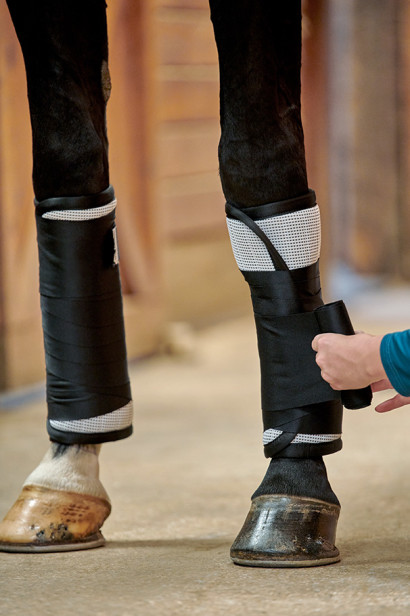Suspensory Ligament Injuries in Horses & Therapies to Support Recovery
By: Dr. Lydia Gray | Updated March 11, 2025 by SmartPak Equine
"My OTTB was recently diagnosed with a pulled suspensory ligament in one of his front legs (we think he hurt himself during turnout). My vet said to expect that he’ll be out of work for at least 6 months. What would you recommend I do to help his healing process? I’ve been reading about your new product SmartFlex Rehab and wondering if it’s appropriate in this situation. Thank you for your insight."
– T.O., Texas

Dear T.O.,
So sorry to hear about your horse’s injury. Unfortunately you are not alone, as a survey by the Center for Equine Health at the School of Veterinary Medicine, University of California-Davis found that, next to colic, injuries to the suspensory ligament were most frequently cited.
Hopefully your veterinarian identified the problem and provided the six-month prognosis using the “gold standard” of tendon and ligament injury diagnosis, the ultrasound examination (along with lameness evaluation and local nerve blocks). That’s because without visualizing the injury to the tissue it’s even harder to predict how severe it is and how long it will take to heal. Fortunately there are several things you can do to give your horse the best chance of returning to his former level of work.
Experts agree that in the early stages, stall rest, cold therapy and the use of anti-inflammatories is critical (whether or not to bandage is up to you, your veterinarian and your horse). While some inflammation is good, too much can actually destroy tissue and prevent the healing process.
Anti-inflammatories include:
- corticosteroids, such as dexamethasone or prednisolone
- non-steroidal anti-inflammatories (NSAIDs) such as bute (phenylbutazone), Banamine® (flunixin meglumine) or Equioxx
Natural inflammation-fighters that can be added to these prescription medications include:
- MSM
- Devil’s Claw
- Yucca
- Boswellia
- Ginger
- Bromelain
- Willow Bark
All these ingredients can be found in the product mentioned – SmartFlex Rehab.
Another reason I like this product as an adjunct to the normal recovery process is for the antioxidants it contains. Super Oxide Dismutase, Curcumin, Quercetin, Grape Seed Extract, Bioflavonoids and Omega 3 Fatty Acids from fish oil all help protect fragile tissue from free radical damage by neutralizing these harmful molecules that are produced in excess after an injury.
Finally, SmartFlex Rehab contains collagen and silica, building blocks of healthy connective tissue, as well as Vitamin C, an important co-factor in the construction of tendons, ligaments and other structures.
I also encourage you to explore with your veterinarian some of the new and exciting treatments for soft tissues injuries such as stem cell, bone marrow or platelet rich plasma injections; shock wave therapy; and others.

But the most important thing you can do for your horse during his rehabilitation is initiate controlled exercise based on how well his ligament appears to be healing as determined by regular, subsequent ultrasound examinations. Careful exercise introduced slowly has been shown to help stimulate healthy new fiber growth that is correctly aligned and has the necessary cross-linking for strength and elasticity.
Your veterinarian will help you outline a program of hand walking, lunging – first at the walk then the trot – riding (again first at the walk then the trot), and a gradual return to cantering, circles, corners, lateral work and other exercise.
Resources on Soft Tissue Recovery
I referred to this book twice on my own horse: once when he was recovering from a pulled suspensory like your horse, and once when he was recovering from colic surgery.
- Back to Work: How to Recondition or Rehabilitate Your Horse by Lucinda Dyer
These are some articles on the health and care of soft tissues, like tendons and ligaments:
Shop for joint, tendon and ligament support supplements for horses.